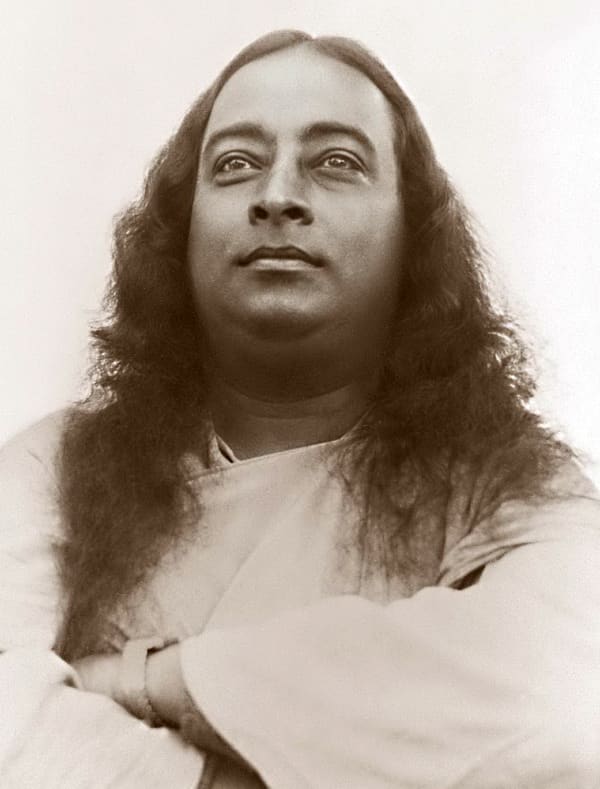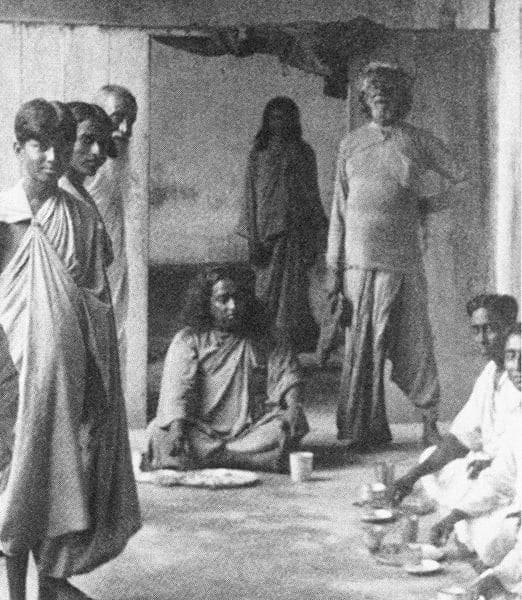Yogananda on teaching won’t power to children
Sri Paramahansa Yogananda spoke a great deal on child rearing. In this article published in the YSS magazine, he encouraged parents to train their children in the virtue of won’t power.

Excerpts from “The Virtue of Won’t Power”
(YSS Magazine Jan-Mar, 2009)
If we survey our inner selves, the majority will find that mostly their lives have been full of yeses, with very few nos. Because most persons follow their impulse to yield to what is immediately pleasant, rather than saying no to what is not for their highest good, they are frequently led unresisting into wrong pursuits that create trouble for them. But all great men and women are full of nos—they have said many more nos than yeses in life.
I remember the story of a little boy who lived with his doting grandmother. She pitied him because his parents had died, and liked to indulge him in every way. One day he brought home from school a pen belonging to another boy and showed it to his grandmother, asking her: “May I keep the pen?” She thoughtlessly said, “Yes, it is all right.” The next time the boy stole some books. She didn’t scold him for it.

Gradually he began to steal money, and in ten years he became a full-fledged thief. He was caught and convicted, and when he was being sent off to prison, he asked to see his grandmother. She came, and he asked her to draw near so he could tell her a secret. And instead of whispering to her, he bit her ear very painfully. She cried out and asked him why he did it. He replied: “That first day I brought home a pen that didn’t belong to me, you said it was all right for me to keep it. If you had stopped me then from taking that pen, I would not be here today.”
It requires will power to teach your children won’t power. That is wonderful training to give them, that they must always be able to say no, for temptation is everywhere.
My mother always tried to teach me to discriminate between my good and wrong desires. Sometimes she would explain why she said no, and sometimes not.
You do great injury to your children by granting all their desires. I remember there was a rich man’s son my mother knew. His mother used to give into anything he wanted. One night he wanted to do something that was very improper; and she told him, “Go ahead, it’s all right.” My mother heard about it and said to that boy’s mother, “You are spoiling your child for good. You are tolerating his bad behaviour; but the world will not tolerate it. When he grows up into an unpopular adult, he will not appreciate you; he will blame you.” One of the habits of this undisciplined child was refusing to eat what he was served. Despite his mother’s cajoling, he wouldn’t touch his meal until given his preferred foods. She talked it over with my mother. Mother said, “That is very simple. I can make him eat, but you must not get soft-hearted. The next time he says that he won’t eat, just say, ‘That’s all right. You don’t have to eat if you don’t want to.’ And then call me.”

So the next time the boy threw a fit about his food, his mother placated him just as my mother had suggested. The son was taken aback at this turn of events. He expected that his mother would coax him to eat. Mother went over, and she and the other lady sat down and began to visit. The lunch was put away. Two o’clock came, and the mother became very restless and said, “I ought to fix him something he likes. He must be starving.” But Mother advised her not to do it. Three o’clock came, and the child began writing on a placard against the wall, “If you call me just once, I will go to eat.” But my mother advised, “Pay no attention, Just ignore it.” And they went on talking. Unsuccessful in his attempts to interrupt them, the boy finally came right near the mother and stood there silently with his placard: “If you call me just once, I will go to eat.” The mother turned to the child and said, “Of course you may eat now.” He gladly ate the food she put before him. But he never forgot that lesson, and never tried that ploy again. He had learned that he had to eat what was put before him or go without. Hopefully, for his sake, a more disciplined life continued thereafter.
Your love for your children must not be misused. Do not cater to what they want; give what is good for them. Real love teaches them to know the difference between good and bad desires. When your child says, “Mother, I won’t eat spinach, I want cake” and you give in to him, you are foregoing the training that will bring the happiness of good health habits. Why is it so easy in life to do things that are wrong and harmful? It seems there is something in this world that always lures us to do what we should not do. That is the setup of this world—the things that cause us trouble are made to seem the most attractive to the senses. You fail to help the child learn won’t power by allowing him to cater indiscriminately to his likes and dislikes. Instil good health habits in children from the beginning. Teach them to eat those things that will benefit them. if they become habituated to crave meat and to develop greed for too much candy and pastries, they will fill themselves up with these things and drop the nutrition that promotes health in the body. The more one eats meat, the less appealing he finds salads. Too much meat-eating leaves residue that is converted into acids that harm the body. How silently the body is sabotaged when it is overloaded with unhealthful foods and deprived of ample fresh fruits and vegetables. Evil is so skilfully camouflaged! Often you do not know that you have trouble until it is too late.

Once I observed in a missionary school in India that during the Bible class there was disruptive noise and unruliness because the teacher was trying to force his view of Christian dogma on the children, and they made fun of it among themselves. Years later in my own school, I had made up my mind that I would not force anything on the students. Part of the curriculum was to discuss different qualities mentioned in the Bible—for instance, the study of why shouldn’t we be greedy. When I taught those classes on the Bible, the students found them so interesting that they purposely never rang the bell on time to dismiss the class. I would ask such questions as, “What is it called when you disregard the fact that your body doesn’t want nutrition and you don’t need more food, and yet you go on eating?” The answer is greed. And what is the result of greed? The answer is indigestion. And when you keep on overloading the body, what happens? The answer is chronic indigestion. And what does that bring? The answer is sickness and maybe even death. So summing it up, should we be greedy? All of the children responded, “No!”
When the boys of my school went back to their homes for vacation, the parents didn’t have to force rules on them. They had learned how to behave. I didn’t tell them, “Do this and don’t do that.” I knew that when boys are told not to do something, they all the more want to do it! I said to them when they came to the school, “This is your home. I am not going to police you, because I want you to learn to govern yourselves. My duty is to explain to you why it is in your own best interest to behave in a certain way—to point out why you should not lie, why you should not be greedy, why you should not fight, why you should not steal, and so on.” Once these things were explained to them, and they understood the whys, the boys themselves made rules according to those principles—and they were even stricter than mine! They elected a leader who by consensus of opinion was the best of the lot. He had to live up to those rules that were given, and they all tried to follow his example. As a result I had a most successful school.

I remember one boy in my school was accused of some wrong act. The teachers felt it was sufficiently serious that they wanted me to expel him. That would have meant that for four years he could not get into any other school. I said, “I won’t do that to him; I cannot sponsor such an idea. He may have done wrong, but I shall reason with him and forgive him.” There was a big commotion of disagreement. So I said to the teachers: “Remember all the things that you have done during and since your childhood. Can you tell me you have never done anything reprehensibly wrong?” They all hung their heads. “If that boy were your son, would you send him out?” No one spoke. I said, “He is my son, and I will hear him.”
So I called this boy to me; he came in very defiant: “Go ahead, I know you are going to throw me out.”
“What makes you think so?” I replied. Again he challenged me rebelliously: “Go ahead.” I replied, “How childish of you. You have done wrong, and you are proud of it. What is the matter with you? Suppose you did do wrong. That doesn’t mean you have to do wrong again.”
He hung his head. “Don’t do it again,” I said. He looked at me like the little child that he was. “You mean you won’t send me away?”
“You know that what you did was wrong, don’t you?”
He said, “Yes.”
“Isn’t that enough?” I said. “Don’t repeat it.”
Tears came in his eyes and he told me, “You know, I had made up my mind that if you sent me away, I would use my life to do all the evil things that I could.” Then he went on, “I am sorry for what I have done, and promise you that I will never do it again.”

Years later when I went back to India, I learned that he had gone to England to further his education and opportunities. He now had a successful career, was very spiritual, and had a wonderful family. He came to me in tears and said, “Do you remember me?” I greeted him lovingly. He said, “That day that you forgave me made me what I am today. It is all due to your faith in me.” He embraced me and cried like a child.
If I had sent that young boy away from my school, he would not have become the remarkable man he is. He would have been nothing today. So remember, love changes people; their part is to repent of their wrongdoing and cultivate discrimination and won’t power to guide their future behaviour.